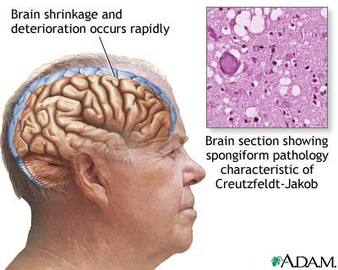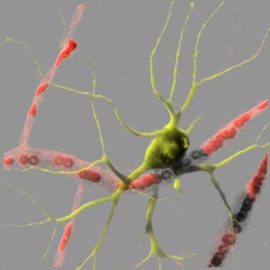What is the Nervous System?

The nervous system is the body’s most well-organized and complex structural and functional system. It strongly affects both an individual’s psychological and physiologic functions. It is responsible for sending, receiving and processing nerve impulses throughout the body as well as regulating and maintaining homeostasis. The nervous system relies on billions of tiny nerve cells called neurons in order to function. These neurons are responsible for carrying information by sending electrochemical impulses through the nerves to other muscles and organs.
Basically, the nervous system is made up of two divisions: the central and peripheral nervous system. The brain and spinal cord make up the central nervous system. The brain is the largest, most complex part of the nervous system. It is composed of more than 100 billion neurons and interconnected fibers. It controls how the body functions, and is also responsible for a person’s personality, moods and emotions, and conscious and unconscious thoughts. The spinal cord is an extension of the brain and functions by carrying messages between the central nervous system and the rest of the body.
The peripheral nervous system includes all neurons other than those in the brain and spinal cord. It consists of pathways of nerve fibers between the central nervous system and all remote structures in the body. Included in the peripheral nervous system are 12 pairs of cranial nerves and 31 pairs of spinal nerves. Nerves that conduct impulses toward the brain and spinal cord are called sensory/afferent neurons. On the other hand, nerves that conduct impulses away from the brain and spinal cord are called motor/efferent neurons. Most nerves, however, are mixed, having both sensory and motor components.
Assessing and Diagnosing Nervous System Problems

Identifying neurologic disorders has always been a challenge. Neurologic disorders range from simple to complex and can have profound consequences for activities of daily living and survival.
When assessing for neurologic problems, you need to establish a baseline data that will be used to compare on-going assessments, diagnosis, management and outcome evaluation. Because of the complexity of the nervous system, assessment is both multifaceted and lengthy. To make it simple, there should be three main components of a neurologic assessment: a comprehensive history, neurologic physical exam, and general and specific neuro-diagnostic studies.
Once a person’s medical history and physical examination have been carefully reviewed, certain diagnostic procedures will be done to help diagnose a specific nervous system disorder. Commonly used non-invasive tests include skull and spinal x-ray studies, computed tomography (CT) scan, magnetic resonance imaging (MRI), positron emission tomography (PET), and electroencephalogram. Common invasive diagnostic tests include lumbar puncture, myelography, cerebral angiography and cerebral perfusion studies.
Common Nervous System Problems

A person who has a neurologic disorder may experience problems that disrupt basic function either permanently or temporarily. Ability to cope with activities of daily living is often altered. There are different kinds of neurologic disorders but in this article, we are only going to mention some of the most common diseases that affect a large number of people worldwide.
Common infections affecting the nervous system are meningitis, encephalitis and epidural abscess. Polio is another nervous system infection that has been controlled since the 1950s when mass immunization was used. However, post-polio syndrome can still develop in polio survivors 30 years after the onset of disease.
Functional disorders include headache (which is the most common), dizziness, neuralgia and epilepsy. Epilepsy differs from seizure in that it is a chronic disorder of repeated seizures. An isolated, single seizure does not constitute epilepsy. Common structural disorders are Bell’s palsy, carpal tunnel syndrome, brain/spinal cord injury/tumors, and peripheral neuropathy. Stroke, transient ischemic attack (TIA), subdural haemorrhage and hematoma, subarachnoid haemorrhage and extradural haemorrhage are some of the most common vascular disorders that are potentially fatal to a person if left untreated. People with vascular disorders usually require life-long supportive care.
Common degenerative diseases include multiple sclerosis, Alzheimer’s disease, Huntington’s disease, Parkinson’s disease and amyotrophic lateral sclerosis (ALS).
Management and Treatment of Nervous System Problems
Treatment options for nervous system problems largely depend upon the diagnosis, origin of the disease, the individual’s overall health and the severity of the condition.
Various medications may be administered to treat specific disorders and in more severe cases, neurological surgery may be recommended. During rehabilitation, complementary therapies may be required, such as acupuncture, physiotherapy and massage. Some people opt for natural and holistic treatments which have been widely used through the ages. It helps soothe nerve as well as address symptoms related to stress and tension. Tissue salts also work by supporting health at cellular level and are safe and effective to use. It usually acts as a natural anti-spasmodic and muscle relaxant and can also help calm the nerves. Some types of tissue salt can also promote mental health by improving memory, concentration and mood.
There are a lot of ways you can do to support and maintain nervous system health. Eat a healthy and well-balanced diet, especially foods that contain vitamin D, calcium and potassium. Stay active by exercising at least three times a week and get sufficient rest for at least eight hours at night. Avoid smoking and drinking alcoholic beverages because it is usually a risk factor in most, if not all, kinds of diseases. Most of all, learn to unwind and reduce or avoid stressors by having a completely healthy lifestyle. Surround yourself with people who will uplift and make you feel good about yourself. Going for yoga or other meditative exercises can also help you relax.
Comments
Most Recent Articles
-
How To Prevent Imha
Your pets too can acquire disease like you. Some of these diseases may be those common ones or those that are serious in nature. Like people, dogs also have their own immune system. Our immu...
-
List Of Skin Diseases And Photos
Skin diseases are a type of infection that inflames the skin causing irritation. A list of skin diseases can include the following.
-
What Deseases Are Caused By Low Vitamin Intake
People who have low vitamin intake may cause often deseases and low immune system. Vitamins and minerals are usually comes from the food we eat such as green leafy vegetables, fruits an...
-
Why is water helpful in our body
If we look several centuries back, in the history of science and discoveries related to evolution of human beings, we come to know that the very first living organism on the planet earth was...
-
5 Common Signs Of Digestive System Diseases
If you are experiencing some problems with your stomach, esophagus, colon, liver or pancreas, and your bowel then you probably have a digestive system disease or disorders. Many people who a...
-
How To Protect Yourself From Vcfs
There is a genetic condition which is somewhat related to DiGeorge syndrome in reference to the abnormality of the chromosome. This syndrome is known as Velo-cardio-facial syndrome, or VCFS,...
-
the Most Common Zoonotic Disease
You may not be familiar or would have never heard the term Zoonotic diseases, but yes they exist. These are infectious diseases transmitted from animals whether wild or domesticated, to huma...
-
How To Protect Yourself From Shingles Diseases
Shingles or herpes zoster is a devastating come back of chickenpox caused by the varicella zoster virus or VZV. Once the person has had chickenpox, VZV stays in the body. It does not c...
-
Tips on how to take care of immunocompromised family member
An immunocompromised person is someone who lacks the ability to immune against the infectious disease; or in simple words it is a person who cannot resist the seasonal infectious diseases th...
-
What Stops Disease Outbreaks From Spreading To Everyone?
Although it is not common that we hear experts and those in authority call an outbreak on something, hearing this word is not something we would want. Outbreaks are often associated with dis...
-
About Hiv And Aids
It was in 1981 that the word was introduced to the disease that is known to cause major damage on your immune system. But it was only in 1984 that caused a panic to the world because of its ...
-
How Shigella Is Treated
Shigella is a bacterium that can cause severe diarrhea or gastroenteritis in humans. Shigella is named after a Japanese scientist named Shiga who discovered the bacteria. Shigellosis, also ...
-
Overcome Your Peripheral Nervous System Diseases
Peripheral nervous system disease is the major disease that can lead to madness if proper measures are not taken within the early stage of the disease. Therefore it is very important to know...
-
How To Treat Penile Diseases
Penile diseases are infections that affect the penis. They mainly affect the foreskin of the penis. Some of the common penile diseases include the phimosis, balanitis and paraphimosis. Most ...
-
How To Cure Leprosy
Leprosy, also known as Hansen's disease, is a chronic bacterial skin infection. Leprosy has afflicted mankind from antiquity and is well-recognized in the ancient civiliz...